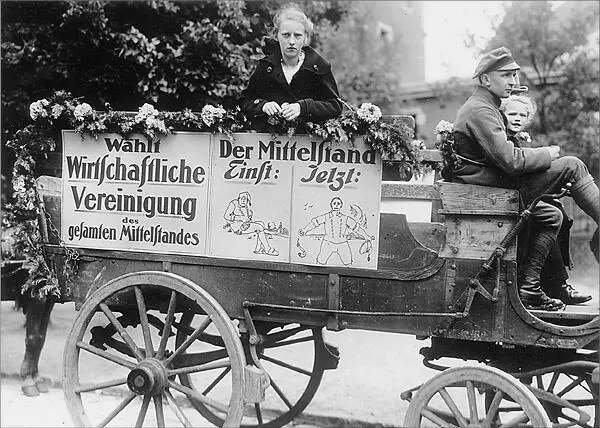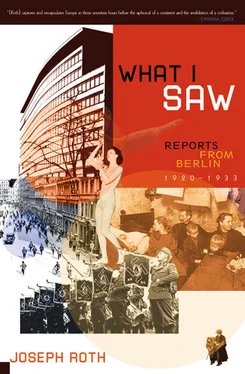I am referring to his servant, today a state-employed guide in the Rathenau House, but a work of the deceased, a living witness to his goodness and efficacy. I want to print his name here: He is Hermann Merkel, from East Prussia. He has been a servant half his life, and in Rathenau’s house he became a fine, quiet, and thoughtful man.“Do you read these books sometimes?” I asked him. “Yes,” he said. “I don’t understand everything in them. But I think to myself: Even if a man doesn’t understand everything — at least reading won’t make him any more stupid.”
Rathenau’s servant talks in aperçus.
As I’m writing these pages, a man comes to call on me, a friend who is going through a bad time — and not just today. He sees that I’m writing about Rathenau, and he tells me: “Four years ago I wrote to him. He gave me a recommendation to the AEG.* But they didn’t have any work at the time. So he sent me four hundred marks.” “Did you know him?” “No! I wrote to him out of the blue. An old professor of mine suggested I do so.”
A stranger writes a letter to a stranger. The good man hears the lament of his brother from the depths. He will have heard many laments, and helped.
I walk past the place where he met his end. It is not true that a murder is just a murder. This one here was a thousandfold murder, not to be forgotten or avenged.
Frankfurter Zeitung, June 24, 1924
31. Election Campaign in Berlin (1924)

The cold, clinical rhythm of this city is immune to “election fever.” So what if the billboards blazon out the parties’ slogans, the willfully inflated promises, the catchpenny philosophies, the phrases and metaphors couched in colorful images. I didn’t see one single person with the patience, the time, and the curiosity to read one of these proclamations — not one who didn’t let the leaflet he had just been handed flutter away. Maybe it takes a particularly dramatic and suggestive image to penetrate the consciousness of these people for whom only work exists, and pleasure. Maybe these fanatics of objectivity, of precision, of antifanaticism are so fixed in their political convictions that no rushed campaign mounted in a single week — consisting of slogans and billboards, speeches and posters — can persuade them. The candid observer is obliged to note, incidentally, that none of the party election machines works with one-tenth of the wit and resourcefulness that are employed by the advertising and PR departments of dozens of factories, businesses, stores, and fashion designers.
The sober bureaucracy of Berlin election propaganda (irrespective of party) confines itself to the old and unsuccessful means. It prints long communications on gray fibrous paper in small type (italic, as a rule, too) that present a curious typographical image. But with this vertiginous waste of words, not one manages to leap forth in the form of an arresting, compelling, bone-freezing optical shout. However many parties there are and however hard some of them try to brand the others as “un-German,” this type of propaganda proves how German they all are. How alien to all of them are the rowdy means of true effectiveness. How, with honest naïveté and a minute scrutiny of the fundamentals, they all seek to persuade the reader — and all they do is bore him. Even in their exaggerations they remain shy. Even in their lies, timorous. They work with the heavy and pathetic weaponry of ethics — made in Germany. No flames lick the walls. No shouts ring from the billboards. The announcements of music halls, movies, the promotion of cigarettes, the fervor of business advertising — their nightly blaze above the roofs of Potsdamer Platz — drown, suffocate, and obliterate any of the political battle cries in an inferno of light and noise and color. The machinery of this half-Americanized city remains clinical and performs its myriad sober functions without passion, without being brushed by even a whiff of political conflict.
I read in the Berlin tabloids desperate efforts by the main editorial writers to describe the “election campaign.” It’s as if they had a powerful telescope through which they viewed the phases and manifestations of the election — and then turned it around to view everything else. In this way they take upon themselves some of the work of the various party offices (admittedly, of all the parties equally), and blow up the confrontations into global conflicts. Anyone who reads their accounts and doesn’t know the city would think there were Wild West — style shoot-outs between the various orators and poster campaigns. In fact it’s not like that at all. A few youths sneak around at night on “glue patrols,” tearing down posters and putting up others. But it takes a trained eye to spot them among the crowds of sneaking pimps, gussied-up whores, love-hungry pedestrians, and reeling drunks. The business of pleasure, the tireless, well-oiled machinery of thrills, “ Amüsemangs, ” gambling clubs, and naked dancers, leaves the voter with precious few resources. It’s only in the market in the mornings that I heard women talking politics with their shopping bags; in among the vegetable stands the cut and thrust of campaigning. The markets are the electoral battlefields of Berlin: I have to say so in the interest of truth.
Admittedly, on Potsdamer Platz, a little forest of papers* has been planted. Its young trunks have such names as Völkischer Ratgeber, Kampfbund, Deutscher Ring, Deutsches Tageblatt, and they are equipped with the inevitable swastikas, which are carved deep into all bark nowadays, on the branches of sentences, in among black-white-red phraseology. On spongy banks of editorials the bluish buttonhole flowers of Scout movements and Wandervögel † grow rampant. Here the roving eye will look in vain for a clearing of common sense. The heavily mossed trunks won’t allow even the merest puff of wit to pass. You find yourself stumbling through ungrammatical, antigrammatical undergrowth. Solecisms flower and thrive in the yawning gulches of the lead articles. You hear the repetitive hack-hack-hack of the nationalist woodpecker.
But these newspapers find only sellers. I am their sole buyer.
Only on Sundays do you come across political scout troops with sandals, walking sticks, and knives. In the woods they do round dances, they rave about nature, and have big brawls with each other. It’s a strange, baffling young generation. It covets the poet’s eye in a fine frenzy rolling, but not his shy piety and love of nature. You see them at railway stations, the blooming, wheat- blond girls, born to be mothers, but turning into political Furies. They wear shapeless windbreakers, full skirts, and short haircuts. They have unnaturally long strides and absurdly mannish gestures, but nature takes its revenge on them, because as soon as they shout out their “ Heil! ” or their “Yech!” their voices take on the repellent shrieking edge of hysteria.
Frankfurter Zeitung, April 29, 1924
32. An Apolitical Observer Goes to the Reichstag (1924)
The location of the German parliament is symbolic. Only Königsplatz separates the Reichstag building from the Tiergarten’s green pastoral. The apolitical observer is sorry to lose the fine May morning on which the new German Reichstag first meets.
The great edifice will be thirty years old in December. It has irritated people of taste and democratic inclinations for the better part of three decades now. Over its entrance is inscribed the dedication: “Dem deutschen Volke” (To the German people). But on its dome, seventy-five meters above street level, is a huge golden crown, a massive weight, completely out of scale with the dome, and utterly at variance with the dedication.
Читать дальше













